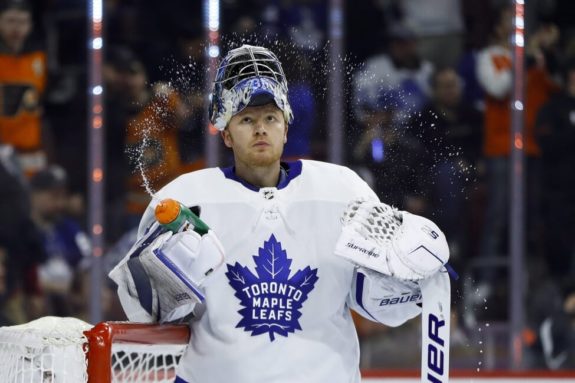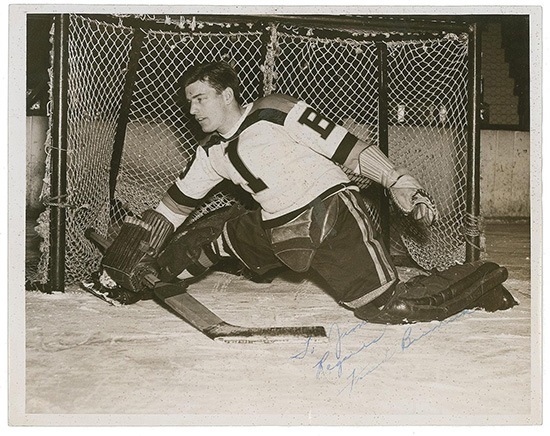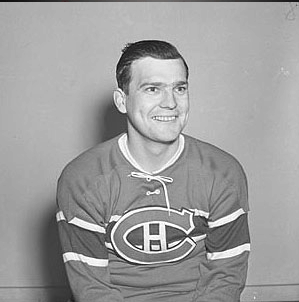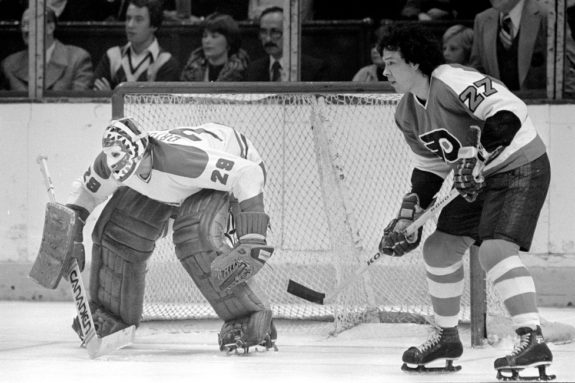Jordan Binnington has already accomplished a lot in his young NHL career. After emerging from the American Hockey League (AHL) as an almost forgotten San Antonio Rampage prospect, he finished his first regular season as a Calder Trophy runner up. He followed that up with the NHL’s greatest accomplishment: a Stanley Cup victory.
Even after such an incredible start, questions remained about Binnington due to the limited NHL exposure he’d seen. He’s spent the 2019-20 season putting those to bed and on Tuesday, Dec. 17, he reached a historic milestone in his career.
By joining this exclusive company of goalies to record 40 wins in their first 60 NHL games, Binnington proved that he’s the real deal. But a closer look at the names on this list will show us just how historic his start has been.
Frederik Andersen
It seems appropriate to start with the only active goaltender on the list: Frederik Andersen of the Toronto Maple Leafs. While he may not have the career accomplishments of others in this group, there’s no question he’s one of the very best netminders in the league today.
Andersen had an incredible start to his career with the Anaheim Ducks, winning 55 games in his first two seasons, carrying a .918 save percentage (SV%) in that time. In his third season, he and his goaltending partner John Gibson won the Jennings Trophy, posting 2.30 and 2.07 goals against averages (GAA) respectively.

The Ducks were then faced with a difficult decision: Andersen was a pending free agent, and they couldn’t keep both amazing goalkeepers in town. So they traded Andersen to the Maple Leafs. But his career hasn’t slowed down. He’s won 30 games in each of his first three seasons in Toronto, and he became the fourth-fastest goalie to win 200 career games earlier this week.
Pete Peeters
Pete Peeters may not be one of the most famous names on this list, but he is still accomplished. He won 246 games in his career with the Philadelphia Flyers, the Boston Bruins, and the Washington Capitals. He even once tried to block a shot from former United States First Lady Nancy Reagan.
His best season by far was in 1982-83 with Boston. He led the league in wins (40), shutouts (8), and GAA (2.37), and he posted an incredible 41.61 goals saved above average (GSAA) and 16.5 goalie point shares (GPS). Those advanced metrics show just how dominant he was in comparison to his peers, as he led the league in both categories.
He won the Vezina Trophy that season with all 21 first-place votes and even came second in the Hart Trophy voting to Wayne Gretzky as the only other player to get significant consideration. He is undoubtedly one of the best goalies of the 1980s.
Frank Brimsek
Now we move into the truly incredible company on this list. Frank Brimsek played all but the final season of his career for the Bruins. He debuted with a bang in the 1938-39 season, winning both the Vezina and Calder Trophy.
He was named to the first All-Star team that season and was named to either the first or second squad for seven consecutive seasons thereafter. That accomplishment was particularly impressive, as he missed the 1943-44 and 1944-45 season due to joining the United States Coast Guard during World War II.

Brimsek won another Vezina Trophy in 1941-42. He helped steer the Bruins to Stanley Cup victories in his rookie season and again in 1940-41. He finished his career with 252 wins and over 31,000 minutes played. He is a Bruins legend and was inducted into the Hockey Hall of Fame in 1966. He was also part of the inaugural class of the United States Hockey Hall of Fame in 1973. He trails only Glenn Hall amongst goalies for career All-Star nominations (Brimsek had eight to Hall’s 10).
Tiny Thompson
Cecil Ralph “Tiny” Thompson was a highly-accomplished goaltender for the Bruins in the 1920s and 1930s. He led the league in wins five times and in GAA and shutouts four times. He helped the team win a Stanley Cup in his debut season, going 5-0-0 in the playoffs while allowing only three goals for a 0.60 GAA with three shutouts.
Thompson would go on to win the Vezina Trophy the following season, his first of four. He was named an All-Star four times as well. He finished his Bruins career with 252 wins, 74 shutouts, and a 1.99 GAA, before playing most of two seasons with the Detroit Red Wings. It was not until last season that Tuukka Rask passed Thompson to capture the Bruins franchise record for wins, a record that had stood since the 1938-39 season.

After his playing career, which ended with the 1939-40 season, Thompson coached briefly in the American Hockey League, before serving in the Royal Canadian Air Force where he coached the Calgary RCAF Mustangs. He went on to become a scout at various levels and was one of the first to consider a player’s personality when evaluating his talent.
Bill Durnan
Few goalies have ever been as dominant in as little time as Bill Durnan. Citing the stress of playing the professional game, he retired after just seven seasons with the Montreal Canadiens, but he led the league in GAA and GPS all but one of those seasons. In each of those six league-leading seasons, he won the Vezina Trophy.

Durnan’s first four years in the league may have been the most dominant consecutive seasons of any goalie ever. Not only did he win the Vezina Trophy and lead in GAA in each of them, but he also led the league in wins each season as well. He amassed 134 wins and 52.1 GPS during those seasons, and in his first and third seasons, he also helped the Canadiens win the Stanley Cup. It’s fitting that he was named one of the NHL’s 100 Greatest Players during their centennial celebration.
Durnan also holds another unique distinction: in the latter half of the 1947-48 season, he was named the captain of the Canadiens. But opponents complained that he left his crease to talk to officials at strategic times, creating unofficial timeouts. The NHL decided to disallow goalie captaincies, meaning both that Durnan was the last goaltender to serve as a captain in the NHL, and, consequentially, that the rule prohibiting goalie captaincies is known colloquially as “the Durnan Rule.”
Durnan retired after the 1949-50 season, with 208 wins and 34 shutouts in just seven seasons. Despite having such a short career, he is an indisputable Hall of Famer. He was named to the Hockey Hall of Fame in 1964.
Ken Dryden
Few readers will need an introduction to Ken Dryden, undoubtedly one of the most decorated goaltenders in NHL history. Much like Durnan, he had a brief career with the Canadiens. Few goalies have made quite such an immediate impact in their career (in fact, Binnington’s debut postseason performance drew many comparisons to Dryden).
Though he played only six games in his first regular season, he was called upon for 20 in the playoffs. He went 12-8 en route to a Stanley Cup and a Conn Smythe Trophy. He became the first player ever to win a Conn Smythe before winning the Calder Trophy (which he did the following season), a distinction he holds to this day.
Dryden would go onto have a career very similar to Durnan’s: he would play just seven more seasons, all with the Canadiens, and he would be dominant in those years. After his Calder Trophy season, he won his first Vezina Trophy and then won four more consecutively to finish his career. He was named an All-Star in every season but the 1974-75 season as well.
Dryden won another Cup in 1972-73, then won four consecutively from 1976-1979. He did not win another Conn Smythe, despite having better goaltending numbers in each of those seasons than in the year he did bring home the trophy. He might have won even more Stanley Cups, except that a contract dispute made him miss the 1973-74 season, which he spent as a law clerk in Toronto, finishing his degree.

Dryden stood six-foot-four, a giant for his day, and was referred to by nemesis Phil Esposito as “that thieving giraffe.” Though he retired at 31, he remained busy, writing books (including The Game, one of the greatest hockey books ever), practicing law, commentating during the Olympics, working as a team executive teaching at his alma mater McGill University, and serving as a Canadian Member of Parliament.
Dryden was inducted into the Hockey Hall of Fame in 1983. Due to the brevity of his career, he won just 258 games and is not a leader in many counting categories. Still, he unquestionably had one of the most dominant, if brief, goaltending careers of all time.
Binnington’s Future
Of course, Binnington’s presence on this list doesn’t mean he will follow the same career trajectory as many of these goaltenders. But it is noteworthy that there isn’t a single “fluke” in this group. Even Peeters and Andersen, arguably the two least accomplished goalies on the list, spent several seasons as a top goalie in the league. For the Blues, who have had very few long term goaltending solutions in their franchise’s history, even that would be a very good outcome for Binnington.

What we know for certain is that in not-quite a full regular season of work, he has already finished as a runner up for the Calder Trophy. And we know he became the first goaltender (surpassing even Dryden) to win 16 games as a rookie en route to his franchise’s first Stanley Cup. Whether he becomes a Hall of Famer or not, he will remain a Blues legend forever for that.